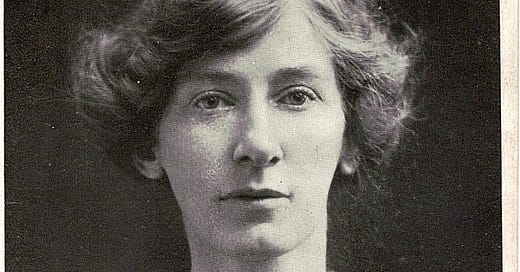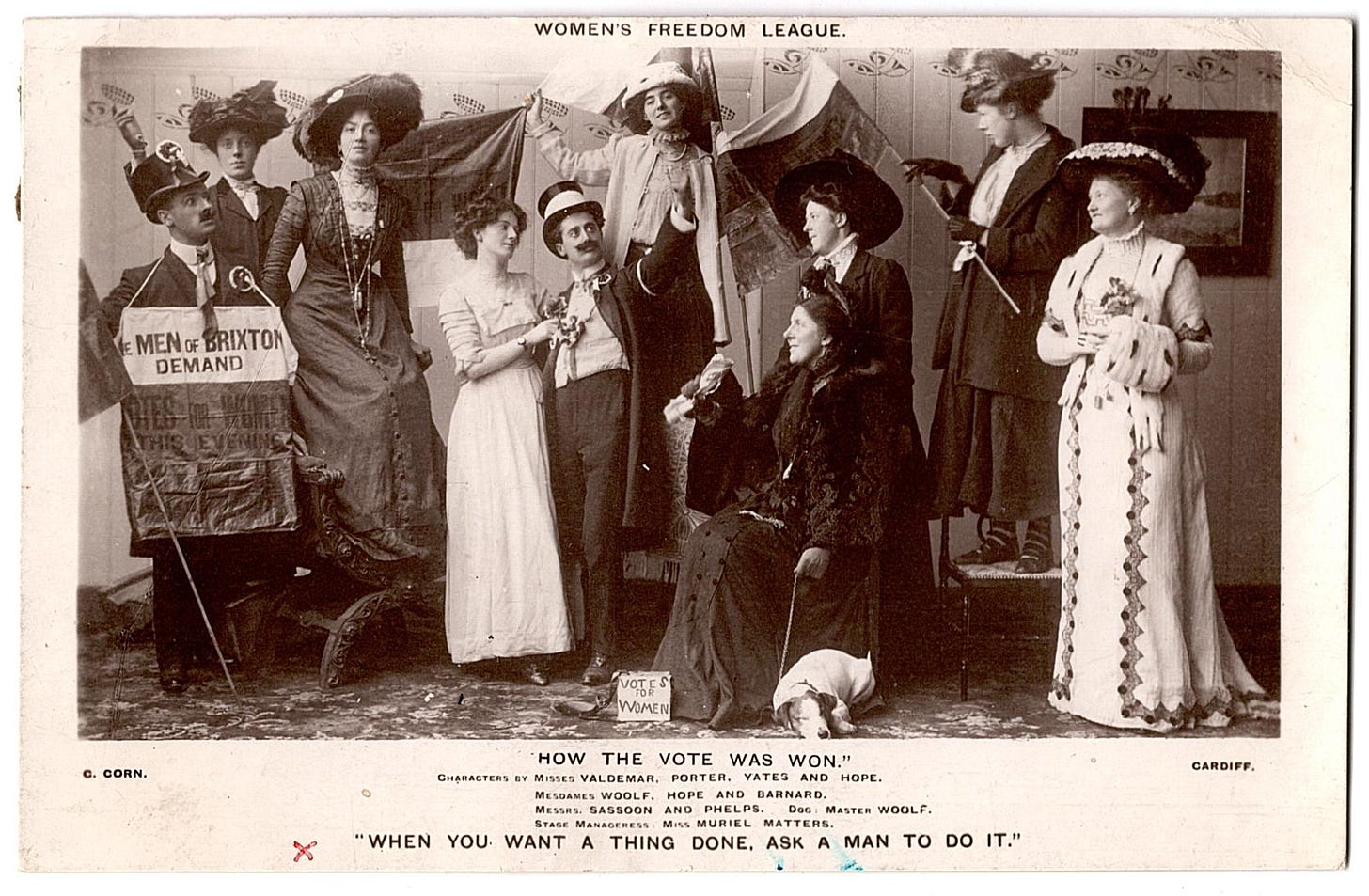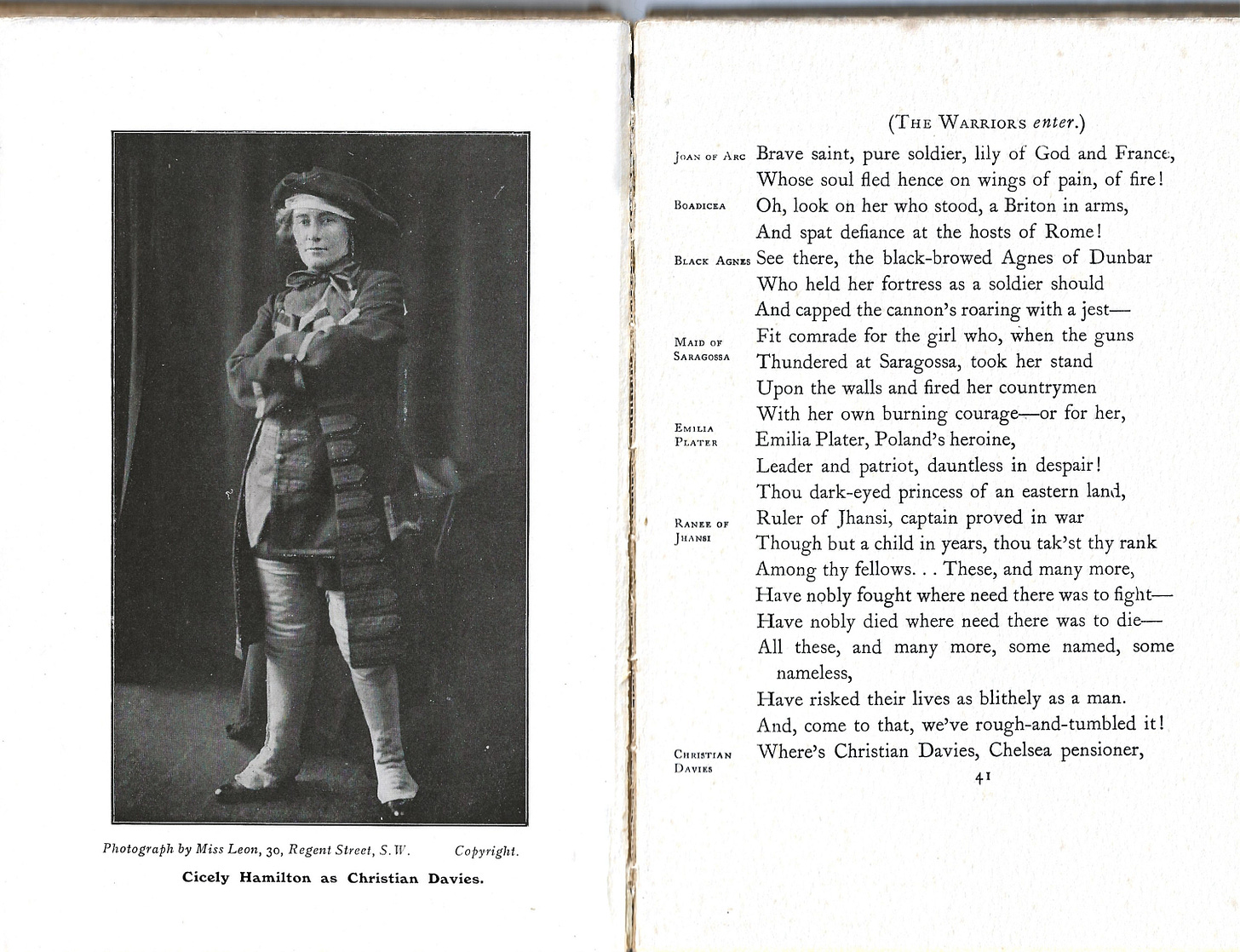Strictly speaking, Cicely Hamilton is not an entirely forgotten woman writer. Persephone Books have republished her novel, William - an Englishman; The Women’s Press republished Marriage as a Trade in 1981, and Lis Whitelaw wrote a biography of her (The Life and Rebellious Times of Cicely Hamilton) in 1990. Some of her suffrage plays have been included in anthologies, including the most well-known How The Vote Was Won, written jointly with Christopher St John (Votes for Women and Other Plays, ed Susan Croft, 2009; The Methuen Book of Suffrage Plays, ed Naomi Paxton, 2013). How The Vote Was Won is still occasionally performed: I saw a performed reading of it at the Orange Tree Theatre in London in 2010, and we put on a performance of it as part of the ‘Votes for Women 100’ celebrations in Bristol in 2018.
Cicely Hamilton
Cicely Hamilton is not completely forgotten, then. However, while her involvement in the suffrage campaign has attracted attention, it seems most of her other work has been overlooked, in particular her anti-war writing.
Cicely Hamilton (1872–1952) is one of my writing heroines. An actress and playwright, she joined the militant Women’s Social and Political Union. She wrote the words for the WSPU anthem, The March of the Women, music by Ethel Smyth. Later, critical of the dictatorial style of the Pankhursts, she left the WSPU to join the Women’s Freedom League, and edited their paper The Vote. In 1908 she founded the Women Writers’ Suffrage League and the Actresses’ Franchise League.
She achieved success with her play Diana of Dobson’s in 1908, and went on to write a number of suffrage plays with her friend Christopher St John (born Christabel Marshall, 1871–1960), including the comedies How the Vote Was Won and The Pot and the Kettle. In 1910 she wrote A Pageant of Great Women which featured fifty two great women including Joan of Arc, Jane Austen, Angelica Kauffman, and Charlotte Corday. Cicely Hamilton herself played Christian Davies (1667–1739), who enlisted in the army as Christopher Welsh. Davies’s disguise was discovered by surgeons after she was wounded at the Battle of Ramillies.
How the Vote Was Won
A Pageant was performed around the country, including at Bristol’s Princes’ Theatre in 1910 and the Albert Hall, Swansea. Cicely Hamilton also wrote the book Marriage as a Trade (1909) criticising women’s limited economic choices which forced them into marriage for want of the skills or opportunity to do anything else.
During the First World War, she worked for the Scottish Women’s Ambulance Unit, and then joined a touring theatrical company entertaining the troops. Many of her novels and plays deal with the issue of war and humanity’s capacity for violence, which she attributed to what she called the herd instinct, the “crowd-life” which overcame people’s “responsible individuality”. These included the novels William - an Englishman (1919), the first novel to be published by Persephone Books, and Theodore Savage (1922), a post-apocalyptic exploration of the collapse of civilisation caused by war.
Her 1926 play The Old Adam (also known as The Human Factor) explores the response of two warring nations when they acquire the technology to disarm one another’s weapons. You might expect this to be a cause for rejoicing, but Hamilton’s disillusionment takes the play in another direction entirely. Unable to use machines, men arm themselves with knives and clubs…
Cicely Hamilton in A Pageant of Great Women
In spite of her pessimism about the possibility of human progress, Hamilton continued to campaign for women’s equality. She was an editor of the The Englishwoman, and worked on the feminist journal Time and Tide. She was active in the Six Point group in the 1920s, campaigning for better child protection laws, legislation to protect widows and their children, rights for unmarried mothers, equal guardianship of children, equal pay for teachers, and equal opportunities and pay in the civil service.
One of the things Hamilton criticised the WSPU about was its obsession with dress and appearance: “its insistence on the feminine note”. In a witty tangle of gender identities, she once attended a fancy dress party dressed as George Eliot (Marian Evans), with her friend Christopher St John dressed as George Sand (Amantine-Lucile-Aurore Dupin), in male costume.
It's thirty-five years since the publication of Lis Whitelaw’s biography, and I am thinking of writing one myself. With that in mind, I’m planning to explore aspects of Hamilton’s life and work in the coming months. And if that means seeking out and reading more of her books, it doesn’t feel like much of a hardship!
Picture Credits:
Cicely Hamilton, Women’s Library on Flickr, No Known Copyright Restrictions
How the Vote was Won, Women’s Library on Flickr, No Known Copyright Restrictions
A Pageant of Great Women (1910) by Cicely Hamilton, author’s collection







Crumbs - lots more research to do! But she does sound fascinating.
Fascinating post, she sounds so interesting & I am looking forward to reading your biography of her! (Plus more snippets here, of course.) I wonder if she had connections with Cambridge women?